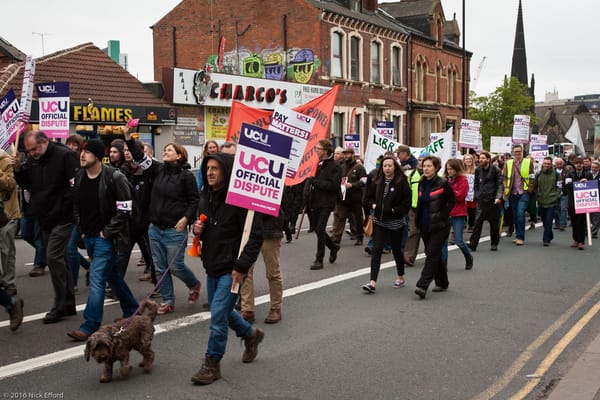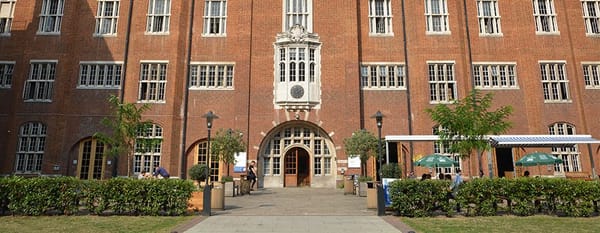The Ongoing Direction of the Union
Last week, Felix reported that the Managing Director of the Union, Jarlath O’Hara, was stepping down, with Jon Tucker to provide interim support. We provide an update on the situation and a discussion on the ongoing direction of the Union
It has been confirmed that Jon Tucker, the Business School’s Faculty Operating Officer, will be providing interim support to the Union following the departure of the Managing Director.
The decision was made after a discussion with College by Jill Finney, the Chair of the Union’s Board of Trustees, the group whose responsibility it is to oversee the Union’s activities. The Board was consulted via email and telephone about the decision, in the absence of a scheduled meeting, but retains the ability to overturn it at the next Board meeting on Tuesday 10th December.
Jill clarified that the decision needed to be made swiftly such that the organisation could continue to function, hence not waiting for the next meeting. “That we haven’t had a Board meeting does not mean the Board should not take action on an issue that needs to be dealt with rapidly; it has to respond regardless of when the meetings are fixed.”
The Board will also discuss the timeline for recruiting a new full-time Managing Director, as well as receiving a presentation from Jon on how he envisions his role in the organisation.
The decision has prompted queries about the Union’s ability to be effective in advocating for students if the College is actively engaged in the Union’s senior management. Regarding the choice to approach College to ask for recommendations, rather than searching externally, Jill said that “this was the most expedient model for ensuring student and staff support in the short-term.” She also emphasised that “there are clear lines between College helping us to be an independent robust Union, and the Union’s ability to negotiate and to take on issues. They are completely divisible, just as discussions about Union finances do not interfere with the ongoing negotiation about halls fees.”
Abhijay Sood, the Union President, offered clarity on Jon’s position within the Union: “Jon has a lot of experience with how both business and charities function, so we want to play to his strengths and have him advise us on how to rectify some of the foundational challenges the Union is facing at the moment. He is not an interim Managing Director, he is not a Chief Operating Officer. He is not here to tell us what to do, he is here to tell us what we can do in terms of what will be effective. He is advising and mostly liaising to get support from the College on operational activities like data protection, recruitment, or building maintenance. Having met Jon, any concerns about conflicts of interest have very much been allayed.”
Jarlath O’Hara, the outgoing Managing Director, added that he believes that this opens new opportunities going forwards. “When someone who is known and trusted says to the College the same things the Union has been saying for a while, maybe it will land firmer.” He also said that Jon’s experience in the Business School will help to offer a “lens of consistency” with regards to how the Union and College interact, in line with how the
College interacts with faculties, on the areas where parallels can be drawn such as building maintenance.
Regarding his departure, Jarlath said that this was the least disruptive time for him to step down – despite the major work ongoing with the Union’s negotiations on halls rent. In essence, the reasoning behind it is a difference of management styles – he has a particular method, and the Union’s ongoing needs require something different; a style that he was not interested in carrying forward, and meant that it was a “healthy time” for a change and a “fresh pair of eyes” on the Union’s issues.
He also discussed with Felix the troubles currently facing the Union, and the ongoing direction he believes they need to take.
Two major issues facing the Union in the past 12 months have been establishing their prioritisation with regards to provision of different services, as well as ensuring clear remit and accountability both internally and with regards to the split of responsibilities between themselves and College. Examples include the ongoing work on health and safety issues in the Union kitchens, as well as general maintenance work on the building – which the Union is currently liaising with the College’s Estates division about. Part of the reason for the disruption has been a lack of clear communication and understanding about what areas fall under whose remit. These two issues will be driving factors in the Union’s new strategy for 2020-23.
Another has been staff turnover. Though some directorates within the Union have remained stable, others have been decimated – with the worst-affected being the Activities team, which saw all three Coordinator roles depart within a short time-frame. Part of the cause is, Jarlath says, a “culture of development” that is intrinsic to the Union – the encouragement of staff to take on and do more. This encourages progression, but with fewer management roles available as one moves up the hierarchy, this actively promotes higher turnover, which the Union has failed to account for in terms of its structure and processes. As Jarlath put it, “if you’re going to consciously fuel that cycle, you need better things in place to mitigate against the turnover.”
A possible restructuring of the Union is therefore on the cards having been discussed at management and Board level; a more “agile” way of working that allows flexibility in addressing emerging needs and changing priorities.
Furthermore, criticisms have been levied that the Union has been too compliant to the College on issues negatively affecting students. However, Jarlath views this as a problem with visibility and communication. Often, the Union will oppose the College on issues, but not in a publicly visible way – a consequence of the “collaborative” style that he and previous sabbatical officers have adopted. “There are officers and unions who are good at shouting about how great they are, but don’t do a lot. It’s tough because communicating takes time – so you end up having less impact in order to communicate it, because it takes time away from what you’re doing. And yet the Union suffers reputationally from not being visible with stuff that happens.”
Finally, he shared what he feels are personal successes during his time in the Union, and his passion for the organisation. “In terms of success, I view it along the lines of what the organisation has achieved while I’ve been leading staff member, not just what I have personally done. I am proud of introducing the Wellbeing Rep Network, and that despite a poor financial year last year we are in a stronger and healthier position today than when I joined four years ago. Most of all, I’d point to us continuing to outperform – I know that we are the envy of many unions, students, and universities in terms of our CSPs, election turnout, systems work with eActivities, and so on.”
“I want to say that I’ve had a really great experience for the last four years. It’s a fantastic role, a brilliant organisation, and I think the stuff that we do is incredible – with ‘we’ being 99% students. It’s been a privilege to be in this position for four years. I’ve been in unions for 20 years, and I absolutely, coming into the role, saw it as the pinnacle of the student movement – there’s no role I’d want above it within the student movement, and it’s felt like that every day I was in the role.”








